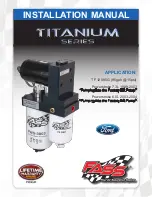
#
If you are using drums or canisters to
refuel the vehicle, you should filter the
fuel before filling.
*
NOTE Damage due to incorrect fuel
Incorrect fuel can lead to engine damage.
#
Refuel only ULSD or diesel fuel with a
sulfur content of maximum 15 ppm.
Usually you will find information about the fuel
quality on the fuel dispenser. If there is no identifi-
cation on the fuel dispenser, consult a gas station
attendant.
The fuel quality recommended for your vehicle is
found on the information label in the fuel filler flap
(
/
page 132).
Notes on low outside temperatures
&
WARNING Risk of fire and explosion from
igniting fuel
If you heat up parts of the fuel system, fuel
may leak and ignite. Depending on the type of
damage, fuel might not escape until the engine
is running.
#
Never heat fuel system components.
#
Contact a qualified specialist workshop
to rectify the malfunction.
Refill only with commercially available ULTRA-LOW
SULFUR DIESEL (ULSD, maximum sulfur content
15 ppm), which fulfills the ASTM D975 standard.
The flow properties of diesel fuel may be inade-
quate at low outside temperatures due to paraffin
separation.
%
Malfunctions resulting from paraffin separation
can only be rectified by heating the entire fuel
system. Park the vehicle in a heated garage,
for example.
To prevent malfunctions, diesel fuel with improved
flow characteristics is available in the winter
months. You can obtain further information on this
at the gas station or from your fuel supplier.
Your vehicle is equipped with a fuel preheating sys-
tem. This additionally improves the flow character-
istics of the diesel fuel by about 14.5°F (8°C).
ULTRA-LOW SULFUR DIESEL can be used without
risk of malfunction down to an outside tempera-
ture of approximately 14.5°F (-10°C).
*
NOTE Damage due to gasoline or paraffin
Gasoline or paraffin in diesel fuel impairs the
lubricity of the diesel fuel. This can result in
damage to the diesel injection system, for
example.
#
Do not add any gasoline or paraffin to
diesel fuel to improve its flow character-
istics.
B20 fuels with bio-diesel content
*
NOTE Damage due to incorrect fuel
Continuous use of fuels with bio-diesel content
over 5% (B20 fuels) can lead to fuel filter clog-
ging. Deposits may also form on the fuel injec-
tor. This may reduce the engine output.
Unburned fuel can get into the oil pan. This
causes the engine oil level to rise. This can
cause engine mechanical damage.
Observe the following points to avoid damage
and reducing the engine output:
#
Fill up with fuels with bio-diesel content
of 5% (ULSD) or less, whenever possible.
#
Regularly check your engine oil level if
you use B20 fuels on a regular basis.
#
Strictly follow the oil change intervals
quoted in the instrument cluster and
within your Maintenance Booklet.
#
Use only engine oils and filters approved
for use in your vehicle.
#
If you do not plan to drive your vehicle for
several weeks, completely fill the fuel
tank in advance with ULSD fuel.
For more information, consult the gas station staff.
The identification of fuels with bio-diesel content
(ULSD or B20) must be clear. If the identification is
not clear, do not refuel. Do not refuel with any
fuels that have not been approved for your vehicle.
The total capacity of the fuel tank may vary,
depending on the vehicle equipment.
Fuel tank total capacity (gasoline engines)
Gasoline engine
Total capacity
M274
Approx. 23 US gal
(85 liters)
288 Technical data
















































